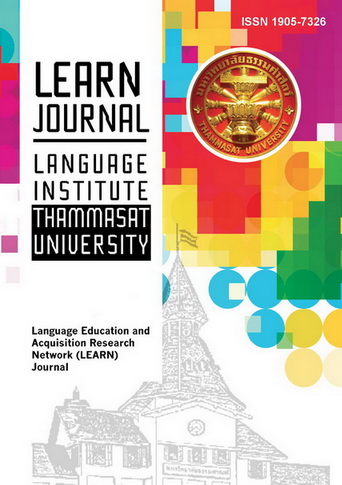The Development of a Communicative English Training Curriculum for Thai Counter Clerks in Convenience Stores
Main Article Content
Abstract
The objectives of the study are to develop a curriculum for an English training for counter clerks in convenience stores in Chiang Mai, Thailand and to evaluate the effectiveness of the developed curriculum. A mixed-method research design was employed. In the curriculum development phase, participants were 20 counter clerks and 10 administrators while 40 counter clerks and 271 English-speaking customers participated in the curriculum evaluation phase. Findings revealed nine tasks of a counter clerk which require English. Trainees’ English communicative competence improved significantly from the pretest to the posttest and from the pretest to the delayed posttest. However, there was a decrease of the mean scores at the delayed posttest when compared with the posttest for all areas of communicative competence. English-speaking customers were highly satisfied with trainees’ use of English, and trainees perceived that the curriculum was very efficient. The study suggested that an English curriculum for adult learners must reflect a wide range of real-life tasks and incorporate real-world language functions.
Article Details
References
intercultural citizenship: Essays and reflections.
Multilingual Matters.
Butler, Y., G. (2011). The implementation of communicative and task-
based language teaching in the Asia-Pacific region. Annual
Review of Applied Linguistics, 31, 36-57.
Chetsadanuwat, K. (2018). Needs of English skills of Thai nurses working
in international hospitals accredited by JCI in Bangkok area.
LEARN Journal, 11(1), 26-46.
Council of Europe. (2001). Common European Framework of Reference for Languages: Learning, Teaching, Assessment. Press Syndicate of the University of Cambridge.
Dirkx, J., & Prenger, S. (1997). A guide for planning and implementing
instruction for adults: A theme-based approach. Jossey-Bass.
Dudley-Evans, T., & St John, M. (1998). Developments in ESP: A multi-disciplinary approach. Cambridge University Press.
Garrison, D. R. (1997). Self-directed learning: Toward a comprehensive
model. Adult Education Quarterly, 48(1), 18–33.
Goullier, F. (2007). Council of Europe tools for language teaching:
Common European framework and portfolios. Les outils du Conseil de l’Europe en classe de langue, Cadre européen commun et Portfolios, Didier, Parigi. http://www. coe. int/t/dg4/linguistic/Source/GoullierOutils_EN. pdf.
Harfitt, G. J., & Tsui, A.B.M. (2015). An examination of class size reduction on teaching and learning processes: A theoretical perspective. British Educational Research Journal, 41(5), 845-865.
Hedge, T. (2000). Teaching and learning in the language classroom. Oxford University Press.
Hiranburana, K. (2017). Use of English in the Thai workplace. Kasetsart Journal of Social Sciences, 38(1), 31-38.
Huang, J., Tindall, E., & Nisbet, D. (2011). Authentic activities and materials for adult ESL learners. Journal of Adult Education, 40(1), 1-10.
Hutchinson, T., & Waters, A. (1987). English for specific purposes: A learning-centered approach. Cambridge University Press.
InterNations. (n.d.). Expat insider 2016: Three years of insights. https://www.internations.org/expat-insider/2016/
Israel, G. D. (2003, June). Determining sample size. Program evaluation and organizational development, IFAS, University of Florida. PEOD-6. https://www.tarleton.edu/academicassessment/documents/Samplesize.pdf
Kuosuwan, B. (2016). The readiness of English communication skills of
tourism employees in Bangkok for entering the ASEAN
community. International Journal of Environmental and Science
Education, 11(18), 12903-12907.
McKay, L., S. (2011). English as an international lingua franca pedagogy
(E.Hinkel, Ed.). Routledge.
Ministry of Foreign Affairs, Kingdom of the Netherlands. (2017, March).
Tourism industry in Thailand.
https://www.rvo.nl/sites/default/files/2017/06/factsheet-toerisme-in-thailand.pdf
Ministry of Tourism and Sports. (n.d.). Tourism statistics.
https://www.mots.go.th/more_news_new.php?cid=411
Nunan, D. (2004). Task-Based Language Teaching. Cambridge University Press.
Office of Assessment of Teaching and Learning. (n.d.). Assessment for
curricular effectiveness. https://ace.wsu.edu/
Rahman, M. (2015). English for Specific Purposes (ESP): A holistic review.
Universal Journal of Educational Research, 3(1), 24-31.
Richards, J. C., & Rodgers, T. (2001). Approaches and methods in
language teaching. Cambridge University
Press.
Saville-Troike, M. (2012). Introducing second language acquisition.
Cambridge University Press.
Skehan, P. (1998). A cognitive approach to language learning. Oxford
University Press.
Srisawat, M., & Rujikietgumjorn, S. (2011). An improvement of speaking
abilities through communicative role play for grade nine learners.
Journal of Education Khon Kaen University, 34(1-2), 173-181.
Tourism Authority of Thailand. (2018, December 10). Press releases:
Thai tourism minister outlines measures to balance, manage and
distribute visitor numbers. https://www.tatnews.org/2018/12/thai-tourism-minister-outlines-measures-to-balance-manage-and-distribute-visitor-numbers/
Taylor, R. (1990) Interpretation of the correlation coefficient: A basic
review. Journal of Diagnostic Medical Sonography, 6, 35-39.
USDA, United States Department of Agriculture. (2020, July 27). Public
distribution: Retail foods. Retrieved November 1, 2020, from
https://apps.fas.usda.gov/newgainapi/api/Report/DownloadReportByFileName?fileName=Retail%20Foods_Bangkok_Thailand_06-30-2020
Wagner, D. A. (1994, July). Use it or lose it? The problem of adult
literacy skills retention. Working Papers. Retrieved November 1, 2020, from https://repository.upenn.edu/literacyorg_workingpapers/4
Wang, Z., Hwang, G., Yin, Z., & Ma, Y. (2020). Contribution-Oriented Self-
Directed Mobile Learning Ecology Approach to improving EFL
students’ vocabulary retention and second language motivation.
Educational Technology & Society, 23(1), 16-29.
World Health Organization. (2020, October 14). Thailand’s reviews
of the health system response to COVID-19.
https://www.who.int/thailand/news/detail/14-10-2020-Thailand-IAR-COVID19


